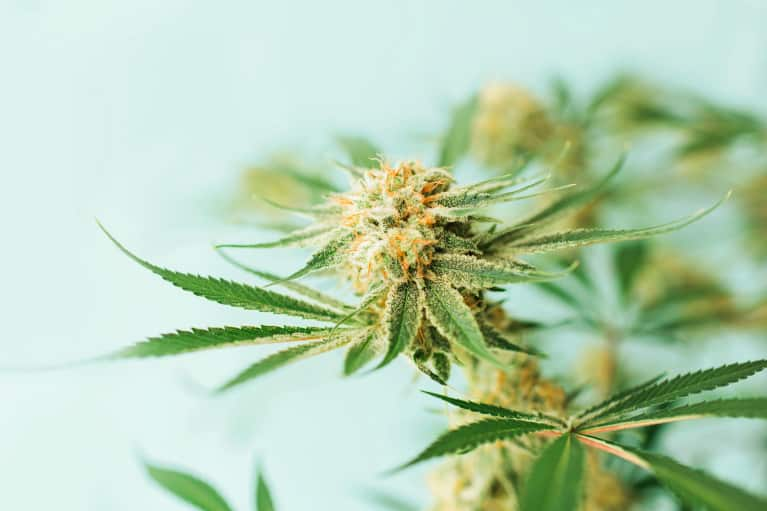The Endocannabinoid System: Could It Explain Hemp Oil's Anti-Inflammatory & Anti-Anxiety Properties?
December 9, 2018 — 10:00 AM
Have you heard of the endocannabinoid system? I'll give you a hint: It's the system in the body that explains why cannabis-based therapies—which include oils made from both marijuana and hemp—have such strong effects on our physiology. If you haven't heard of it, you're not alone. It's a relatively new discovery and the science of this system, abbreviated ECS, is still very much developing. In fact, it's one of our Wellness Trends to Watch for 2019.
But with the massive rise in popularity of hemp oil, and the fact that more and more states are legalizing medical and recreational marijuana, it's a topic we should all understand on some level. As the author of the book CBD Oil Everyday Secrets and the health editor here at mindbodygreen, it's my job to stay up to date on the science of the ECS and hemp—and share that info with all of you.
The endocannabinoid system 101: This is what it really does.
The endocannabinoid system is known as a "master regulatory system" and works to maintain homeostasis in the body, which is a science-y way of saying it works to keep your body balanced. So how does it do that, exactly? Science says it does this in a LOT of ways. The ECS has been connected to physiological processes that range from pain perception and blood pressure regulation to blood sugar balance, sleep quality, and digestion. In reality, this list could go on and on.
The ECS is a huge deal and could mean big things for medical research and health care; and much like the microbiome, we're learning more about it all the time. "Because emerging science is showing that the ECS is one of the central signaling and regulatory systems in the human body, new discoveries about the importance of this system are being published every day," said Robert Rountree, M.D., an integrative medicine physician and main stage speaker at revitalize 2018. "That is part of what makes the study of the ECS so exciting—the more we know about what this system is and does, the more we understand how supporting it can affect a huge range of conditions from obesity to chronic pain to addiction. The potential impact is enormous," he explained.
So why all the attention right now? The developing science of the ECS is helping to explain why, exactly, taking hemp oil—which is full of cannabinoids like CBD as well as other beneficial terpenes and compounds—is so beneficial to our health.
Hemp oil and the endocannabinoid system.
We know that hemp oil is an effective therapy for a wide range of conditions, but what does that have to do with the ECS? According to Martin A. Lee, the director of Project CBD and the author of Smoke Signals, "Cannabis works because CBD and THC and other components of the plant mimic and augment the effects of endogenous compounds, called 'endocannabinoids,' that the human brain and body produces." Yep, you heard that right. Our bodies actually produce compounds very similar the ones in hemp oil all on its own. Two of these endocannabinoids are called 2-AG and AEA, and along with endocannabinoid receptors—called CB1 and CB2—they make up a crucial part of the endocannabinoid system as a whole.
So if we have naturally occurring cannabinoids, why do we need to take them in the form of hemp oil? "If a person is deficient in endocannabinoids—as many people are because of poor lifestyle choices and too much stress—then cannabis-derived therapies can fill the gap and restore physiological balance, which is the essence of health," Lee explained.
Conditions and symptoms related to the endocannabinoid system.
Understanding the science of the ECS and the concept of "endocannabinoid tone" explains, in part, why oils extracted from hemp are touted as effective remedies for such a wide range of conditions, including but not limited to insomnia, pain, anxiety, IBS, headaches, PTSD, nausea, autoimmune disease, seizures, and even cancer.
According to Lee, "Scientific studies show that cannabis compounds synergize favorably with conventional chemotherapies, potentiating the latter so that toxic drugs are effective at lower doses." Hemp-based therapies are also far safer than many pharmaceutical drugs, like benzos, which are used to treat anxiety, and opiates, which are used to treat pain.
How to support the endocannabinoid system with herbs and supplements.
So is taking hemp oil the only way to support the ECS? Actually, no. While supplementing with hemp oil is a great place to start, there are quite a few ways to support this system, starting with reducing stress, getting high-quality sleep, and eating a nutrient-dense diet full of real foods. In addition, cannabinoids have also been found in plants like hops, clove, and rosemary, so consuming these or supplementing with them could help support the health of your endocannabinoid system.
In addition, our endocannabinoids are synthesized from omega-3 fatty acids, so making sure you're getting enough fatty fish and flaxseeds in your diet—or supplementing with a high-quality omega-3 supplement—can help support your body's endocannabinoid tone and reduce inflammation.



No comments:
Post a Comment